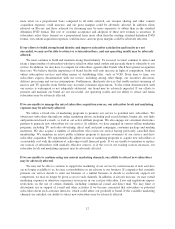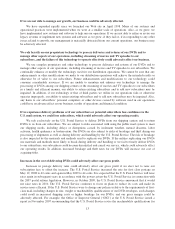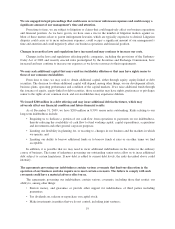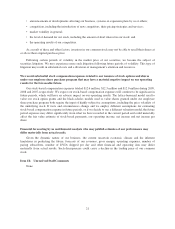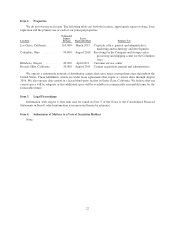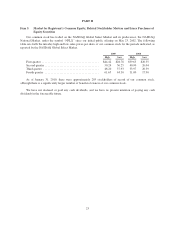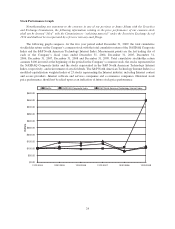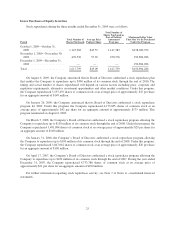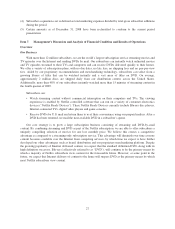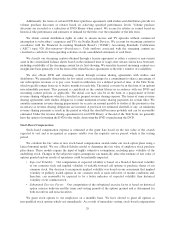NetFlix 2009 Annual Report Download - page 25
Download and view the complete annual report
Please find page 25 of the 2009 NetFlix annual report below. You can navigate through the pages in the report by either clicking on the pages listed below, or by using the keyword search tool below to find specific information within the annual report.We are engaged in legal proceedings that could cause us to incur unforeseen expenses and could occupy a
significant amount of our management’s time and attention.
From time to time, we are subject to litigation or claims that could negatively affect our business operations
and financial position. As we have grown, we have seen a rise in the number of litigation matters against us.
Most of these matters relate to patent infringement lawsuits, which are typically expensive to defend. Litigation
disputes could cause us to incur unforeseen expenses, could occupy a significant amount of our management’s
time and attention and could negatively affect our business operations and financial position.
Changes in securities laws and regulations have increased and may continue to increase our costs.
Changes in the laws and regulations affecting public companies, including the provisions of the Sarbanes-
Oxley Act of 2002 and recently enacted rules promulgated by the Securities and Exchange Commission, have
increased and may continue to increase our expenses as we devote resources to their requirements.
We may seek additional capital that may result in stockholder dilution or that may have rights senior to
those of our common stockholders.
From time to time, we may seek to obtain additional capital, either through equity, equity-linked or debt
securities. The decision to obtain additional capital will depend, among other things, on our development efforts,
business plans, operating performance and condition of the capital markets. If we raise additional funds through
the issuance of equity, equity-linked or debt securities, those securities may have rights, preferences or privileges
senior to the rights of our common stock, and our stockholders may experience dilution.
We issued $200 million in a debt offering and may incur additional debt in the future, which may
adversely affect our financial condition and future financial results.
As of December 31, 2009, we have $200 million in 8.50% senior notes outstanding. Risks relating to our
long-term indebtedness include:
• Requiring us to dedicate a portion of our cash flow from operations to payments on our indebtedness,
thereby reducing the availability of cash flow to fund working capital, capital expenditures, acquisitions
and investments and other general corporate purposes;
• Limiting our flexibility in planning for, or reacting to, changes in our business and the markets in which
we operate; and
• Limiting our ability to borrow additional funds or to borrow funds at rates or on other terms we find
acceptable.
In addition, it is possible that we may need to incur additional indebtedness in the future in the ordinary
course of business. The terms of indentures governing our outstanding senior notes allow us to incur additional
debt subject to certain limitations. If new debt is added to current debt levels, the risks described above could
intensify.
The agreements governing our indebtedness contain various covenants that limit our discretion in the
operation of our business and also require us to meet certain covenants. The failure to comply with such
covenants could have a material adverse effect on us.
The agreements governing our indebtedness contain various covenants, including those that restrict our
ability to, among other things:
• Borrow money, and guarantee or provide other support for indebtedness of third parties including
guarantees;
• Pay dividends on, redeem or repurchase our capital stock;
• Make investments in entities that we do not control, including joint ventures;
19





